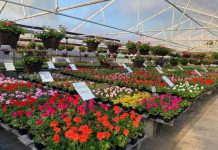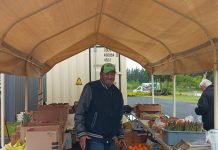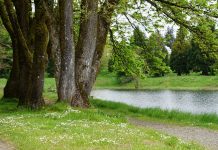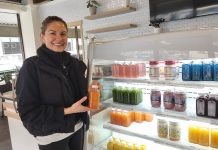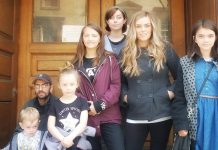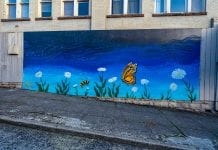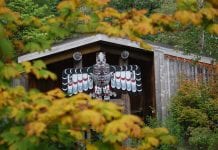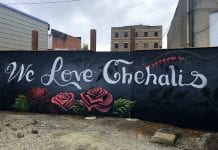 “I never thought I would be known as ‘The Bee Lady,’” laughs Susanne Weil, which is not surprising since she is an Associate Professor of English and Humanities at Centralia College. But these things always start out so simply. Weil tells how back in 2008, her husband, Peter Glover, went to a workshop led by Bob Harris from the Rose of Sharon Farm. Glover attended to find out how bees could help them on their own farm. He came home from the workshop and announced, “We’re going to keep bees!”
“I never thought I would be known as ‘The Bee Lady,’” laughs Susanne Weil, which is not surprising since she is an Associate Professor of English and Humanities at Centralia College. But these things always start out so simply. Weil tells how back in 2008, her husband, Peter Glover, went to a workshop led by Bob Harris from the Rose of Sharon Farm. Glover attended to find out how bees could help them on their own farm. He came home from the workshop and announced, “We’re going to keep bees!”
Ironically, that same week, Weil and Glover watched a television special about bees where she first realized that bees were in trouble. After learning about the importance of pollination, Weil became even more interested in learning about ways to save the bee population.
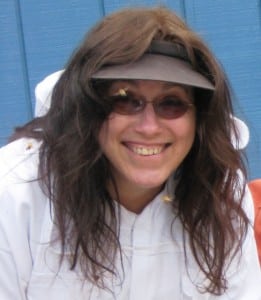
Soon a meeting was held to see if anyone in Lewis County was interested in a local bee group, Lewis County Beekeepers, and an astounding 45 people showed up. Officers were nominated and no one wanted to be the secretary. Once again Weil’s husband stepped up and declared, “Susanne will do it.” (Don’t worry, Glover is also very involved. He has served on the board since it began and is now the Education Coordinator.)
After that, Weil started diving into the subject, studying and learning as much as she could about bees. Glover and Weil then started with two hives of their own in 2009. Weil was surprised by how much she enjoyed the bees. “I became absolutely fascinated by them. I would get a cup of coffee and sit and watch them come and go, building up the hives. I learned to identify the queen and watched the babies hatch.”
The club has grown in membership to close to 200 official paid members, and a mailing list of over 600. Susanne has maintained her secretarial duties and has even expanded into handling similar duties for the state beekeeping organization.
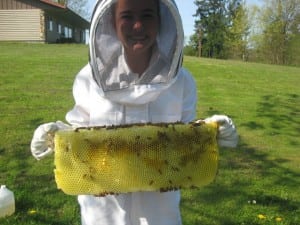
Weil’s newfound expertise also allowed her the amazing experience of helping others outside of Lewis County and Washington State – way outside. In the fall of 2014, she went to Kenya to teach beekeeping to farmers through an NGO (non-governmental organization) of a former club member. The farmers were very excited to learn beekeeping as the honey is highly prized and can be easily sold. Weil taught eight short courses over a five week period to over 400 farmers.
Weil tells us that Lewis County Beekeepers provides classes, workshops, and mentoring.
The club is also proud to offer a youth scholarship for kids in grades 6 to 11. The club has worked with vendors to provide the gear to outfit the youth in getting started in beekeeping. Applicants and their families must be new to beekeeping, families must be willing to help the kids in the project. Two youth were funded in 2014, one in 2015, and this year the club hopes to fund 3 or 4 youth. It’s a terrific deal for the kids as they get the bees, gear, a free class, and a mentor for the first year. If the kids meet all the requirements and finish the classes, and want to continue keeping bees, they get to keep all the gear for free.
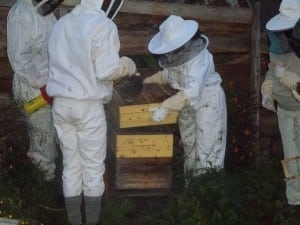
Free mentor workshops are offered once a month from April to September, covering a variety of problems that a beekeeper may run into. In these workshops, people have an opportunity to suit up and learn how to do things like hive inspections. These workshops are also open to the public, not just club members.
Weil says that Lewis County is a great place to be a beekeeper because bees need natural food, and this area has a lot of berries, gardens, and farms. Weil wants to be sure that prospective beekeepers understand, “This is animal husbandry. You have to be willing to do the work. You really have to take care of them like a goat or a cow.” She goes on to say though, that, “Anybody who has the initiative and willingness to put in the time can raise bees.”
Weil is passionate about beekeeping and encourages others to join the hobby. But what if you don’t have room or the ability to raise bees and still want to help out the bee population? It’s simple – anyone who keeps a garden is providing bees with nectar. So no matter how much room you have, if you can plant and grow even a small amount, you are helping to save the bees that are so vital to our ecosystem.



